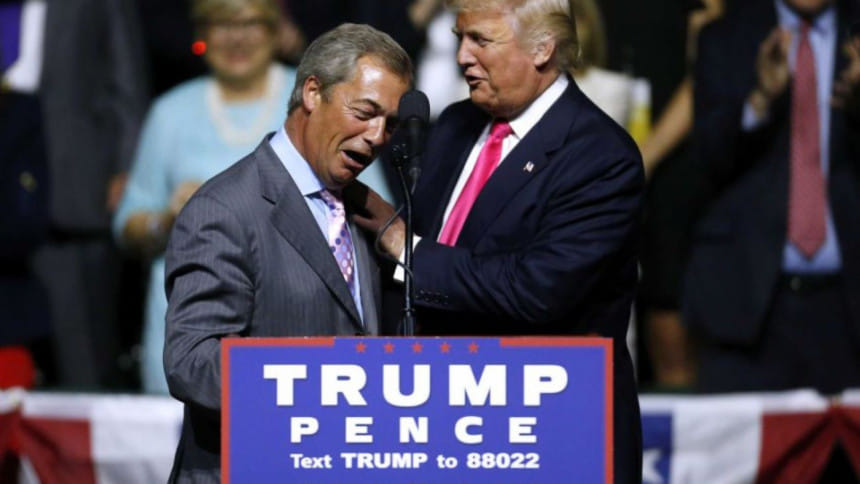Wind of revisionism blowing in the UK and USA!

Two former British prime ministers, Tony Blair and John Major, have within 24 hours of each other questioned the Brexit process, stating "there's a perfectly credible case for a second referendum on leaving European Union".
On the other hand, amid suspicion of hacking and questions of integrity of the election results of the US in the battleground states - Michigan, Wisconsin and Pennsylvania - Green Party presidential candidate Jill Stein has launched a vote recount process. The margins of victory for Trump in those states, otherwise considered Hillary-leaning, were 11,612, 27,257 and 68,236 respectively. In contention are 46 electoral votes that the three states offer, just enough for Hillary, theoretically speaking, to make it to the presidency.
In Wisconsin counties, Clinton received a substantially smaller share of votes (electronically) than in those that used paper ballots, according to a media analysis. A compelling evidence of voting anomalies finds resonance in the words - 'hacked or otherwise manipulated' - being used by J. Alex Halderman, Director of the University of Michigan Center for Computer Science and Society.
No concrete proof of hacking or manipulation has yet been found. But Hillary Clinton, after an initial pause, came out staunchly backing Jill Stein's selfless initiative for a recount. Whilst it strengthens the cause of democratic auditing, this has infuriated Donald Trump to no end. He awaits the technically certification of his victory by electoral college votes in December.
Even without a miraculous overturn of the electoral result, Hillary's win in the popular votes by 300,000 over Donald Trump gives her a moral clout that a bipartisan democracy attaches value to.
At first, an analogy was drawn between the jarring outcome of the Brexit vote and the shock victory of Donald Trump as president. It was based on a narrow premise of a surprise element being common to both the episodes. Note though the fact that the calibration of the two events differed; the first one relates to the long-term future of Britain in an extraordinary context, while the second concerned itself with a new US leadership for the next four years.
Now parallels are being drawn in terms of revisionism in the UK and the US towards apparently settled facts. With Britain, second thoughts are pronounced about Brexit, but in the case of America it is a matter of recount. A reversal of the election result is unlikely, if not impossible.
Tony Blair is attempting a political comeback through capitalising on the Brexit issue. But motive is not so important here as the substance and timeliness of what he says: "Britain's departure from EU is not etched in stone". In an interview with the New Statesman, he said, "It can be stopped if the British people decide that having seen what it means, the pain-gain cost-benefit analysis doesn't stack up."
The UK will be forced to borrow an extra 58.7 billion sterling pounds over the next five years because of an economic slowdown triggered by the exit, according to estimates published by the office of Budget Responsibilities. Independent government agencies state that growth will slump to just 1.4 percent next year - the weakest rate since 2009.
Staunch Remain campaigner Lib. Dem leader Nick Clegg has take soundings from Blair to follow up on a recent discussion with former chancellor George Osborne on Britain quitting the EU.
They suggest that there's a global vacuum and 'getting senior Lib. Dems on side could be seen as an attempt to galvanise centre-ground politics and restore New Labour thinking in the UK'.
A little more pertinently, John Major, a former Conservative prime minister lends a powerful voice to the cause. The Guardian quoted him as saying, "Case for the second Brexit referendum is credible. Major argues '48 percent of voters who wanted to remain should not be subject to the "tyranny" of the majority.'
The overarching argument goes like this: Departure and destination are not one and the same thing. The British public voted for departure but they did not vote for a destination. The pathway to it should be laid by the government based on concrete plans and programmes, including relationships with the common market and then put to a second referendum.
PM Theresa May still sticking to her Brexit adamancy, does not realise that political dynamics have overtaken her ultra-conservative style of holding all Brexit-related matters close to her heart. She is said to be appealing a court ruling that Parliament should have a vote before the final exit negotiations begin. Supposing she loses the appeal, would she not be courting a constitutional crisis? Or even a snap poll?
The bottom line is that the Parliament – or the British people - should in the end be allowed to pass judgement on the specific exit deal negotiated with the EU. That route may also lead to a second referendum!
The writer is the contributor of The Daily Star.
Email: [email protected]

 For all latest news, follow The Daily Star's Google News channel.
For all latest news, follow The Daily Star's Google News channel. 



Comments